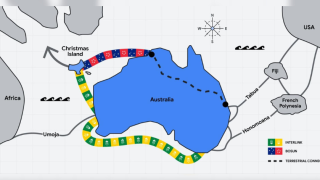From its point of presence in Karachi, Tata said it will now be able to offer enterprise customers its Global IP VPN services, the first commercially available Ethernet services in Pakistan. It is also offering its MPLS services in the country.
"Pakistan is a growing and diverse economy which is enjoying increasing international investment," said Radwan Moussalli, managing director for Tata’s Middle East and North Africa region. "This is the 100th country reached by our MPLS services and the 52nd by our Ethernet services, giving us the largest Ethernet footprint in the world. The MPLS and Ethernet node in Pakistan will allow businesses to connect to their offices in Pakistan and around the world using our extensive regional and global presence."
Moussalli said the new services will be aimed particularly at banking, financial services and insurance companies looking to extend their reach into Pakistan’s economy, at the same time as migrating from international private lines to next-generation standards.
“Manufacturing, energy, IT and software development are other fast-growing sectors of the economy which will benefit from improved connectivity to the region and the rest of the world,” he added.
"The India to Pakistan cross-border connectivity will give us a unique value proposition," said Rashid Shafi, senior executive vice president with Multinet Pakistan Private Limited. "Enterprise customers will be able to choose from point-to-point and multi-point MPLS and Ethernet connectivity options across both locations."
In the last year Tata has signed global partners to establish PoPs in Doha in Qatar, in collaboration with incumbent Q-Tel, Riyadh in Saudi Arabia, with Mobily, and Dhaka in Bangladesh, with ADSNL.It claimed it has also increased ten-fold its capacity into Dubai in the United Arab Emirates, in association Etisalat and added a second node in Colombo in Sri Lanka.
Tata said it is also half way through the construction of the TGN-Gulf submarine cable system in the Middle East, due for completion within the next four months.




